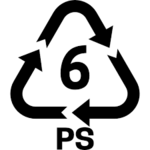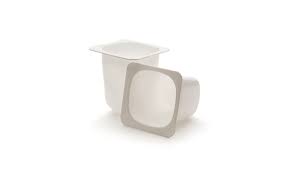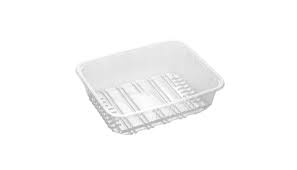PS (6)
PS (Polystyrene) is a type of plastic commonly used in Pots Tubs and Trays (or otherwise known as PTT) and is captured as PS (6) in WikiWaste. Expanded Polystyrene (EPS) can be used as a packaging fill material and is captured in the same category in WikiWaste.

PS (6) plastic is a naturally occuring transparent thermoplastic that is available as both a typical solid plastic as well as a rigid foam material (Expanded Polystyrene) (EPS) and extruded polystyrene (XPS). PS plastic is commonly used in a variety of consumer product applications and in commercial packaging[1]. Dow Chemcial Company invented a proprietary process to make their trademarked and well known polystyrene foam product "styrofoam" (EPS) in 1941[1].
The solid plastic form of polystyrene is commonly used in medical device applications like test tubes or petri dishes, or in day-to-day items like the housing on smoke detectors, CDs cases, and frequently as a container for foods like yogurt and individual desserts[1]. The foam form of polystyrene (EPS) is most often used as a packaging material particulalry in high value items such as televisions, washing machines, dishwashers etc [1] where it has been moulded to fit the product it is protecting. Polystyrene beads are tiny bits of expanded polystyrene and are commonly found in bean bags and childrens toys such as in stuffed animals/teddy bears and as home insulation. The larger loose form of EPS (in the shape of 'figures of 8') are most commonly used to protect smaller less expansive items although their use is being phased out with more environmentally friendly alternatives (such as brown paper packaging) which can be re-used and recycled more easily.
Polystyrene is typically (but not always) a homopolymer i.e. that it is composed only of the monomer styrene in combination with itself[1]. It can be classified as either a thermo plastic material (can be heated to its melting point, cooled, and re-heated again without significant degradation) or a thermoset material (which instead of burning liquefies, allowing it to be easily injection moulded and then subsequently recycled, although thermoset plastics will not reliquify once they are "set" in solid form; they can also only be heated once, (the first heating usually during injection moulding process), this causes the thermoset materials to set resulting in a chemical change which cannot be reversed)[1].
- Polystyrene Examples
-
Yoghurt Pots (all rights reserved)
-
Plastic trays (all rights reserved)


